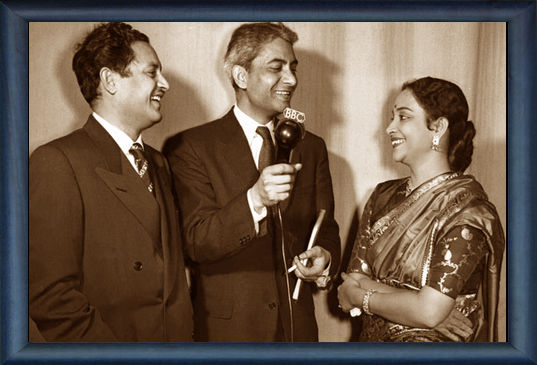Geeta Roy was born on 23rd of November 1930 at Faridpur, East Bengal. Her father was a Zamindaar. When she was just 12, her parents shifted to Bombay. Geeta got her music training from the composer Hanuman Prasad. He trained her in singing and later he launched her in a chorus song in Bhakta Prahlad (1946). She had two lines to sing but that was enough to change her destiny. She sang two lines in two songs of the film: 'Ab Jani Re Pehchani Re..' and 'Suno Suno Vintee Hamari..'. She got few more chances to sing in films like Kashmir Ki Kali (1946 - 'Ye Kisne Meri Hasraton Me Aag..'), Raseeli (1946 - 'Neha Laga Mukh Mod Gaya..' and 'Nainon Ke Pyale Se..') and Circus King (1946 - 'Preet Kisi Ko Na Chhode..').
Music director
S. D. Burman liked her voice and offered her a solo in Do Bhai. The music of that film clicked in a big way. The biggest hit of the film was 'Mera Sundar Sapna Beet Gaya..' which had the voice of Geeta Roy. She was only seventeen then. Disc sales of the song rocketed to new heights. This gave Geeta loads of offers, and she became the top most playback singer of the Hindi film industry. Her collabration with composer
S. D. Burman gave her career new heights.
Only two singers managed to survive the Lata onslaught in the 1950s.
Shamshad Begam and Geeta Roy. Though relegated to the second spot, Geeta managed to hold her own against Lata for more than a decade and she and Lata were the premier two female playback singers of the 1950s. At this time , Geeta ruled the roost. But her work up to now was mainly devotional, and she was in danger of being slotted. But 1951 also saw the release of a film, Baazi. Baazi with its fast, jazzy tracks changed that. 'Tadbeer Se Bigdi Hui..' became a rage and Geeta's image was never the same. Directed by first time director Guru Dutt, the film, a crime thriller was a trend setter of sorts, leading to a spate of urban crime films that Bollywood churned out in the 1950s. The jazzy musical score revealed a new facet to Geeta's singing. The appeal in her voice and the ease with which she went western was marvellous to behold. While every song in the film was a raging hit, one stood out for special appeal. From then on in the 1950s for a club dance or a seductive song, the first choice was Geeta. During the recording of the song she met the young director of the film, Guru Dutt. Thus blossomed a romance and an impulsive extrovert, Geeta married saturnine Guru Dutt on 26 May 1953 and had three children Tarun and Arun and a daughter Nina. Geeta went on to sing some of her best songs in her husband's films while continuing singing in various outside assignments as well.
Around this time, novice composer
O P Nayyar approached Geeta. Nayyar's first film Aasman bombed, but she saw his potential and recommended him to Guru Dutt. With Aar Paar the same year, both composer and singer scaled new heights with 'Babuji Dheere Chalna..' and 'Yeh Lo Main Hari Piya..'. Theirs was to be an eventful partnership yielding eighteen classic solos. Her sensuousness made her a favourite for rock and roll and seductive songs- 'Banki Adayen..' from Amanat, 'Aye Dil Mujhe Bata De..' from Bhai Bhai and of course 'Mera Naam Chin Chin Choo..' from Howrah Bridge. She sang for most actresses of her time from Geeta Bali to Waheeda Rehman but it was the former on whom Geeta's voice fit perfectly. The Geeta -
S. D. Burman team was a legendary one, dishing out hit after hit. Films like Do Bhai, Baazi, Munimji, Nau Do Gyarah, Kaagaz Ke Phool and Sujata are just some examples. By the late fifties, her marriage had run into rough weather and was on the rocks. Her life was fraught with personal problems and she therefore almost quit singing. Last time people heard her in film Anubhav (1971) which had the music composed by her brother
Kanu Roy.
Guru Dutt's liaison with Waheeda Rehman and Geeta's refusal to work in his pet project Gouri, along with his apparent refusal to let Geeta work on outside projects broke the marriage. To quieten things down Guru Dutt launched a film Gauri (1957) with her in the lead. She was to be launched as a singing star and it was to be India's first film in cinemascope but the film was shelved after justa few days shooting. This was the time when one heard complaints from music directors about her not being easily available for either rehearsals or recordings. She neglected her riaz. And to make things worse both of them took to drinking heavily. Prior to their last attempt to reconcile, Guru Dutt committed suicide on October 10, 1964.
Geeta was a broken woman, shattered by his death. She now had neither her singing or her husband. Geeta suffered a nervous breakdown. When she recovered she found herself in a financial mess. She did try to resume singing again, cutting discs at Durga Puja and giving stage shows, even doing a Bengali film, Badhu Bharan (1967) as heroine! But her health kept failing as she drank herself to a point of no return. She died of cirrhosis of the liver on July 20, 1972 at the age of 41.

